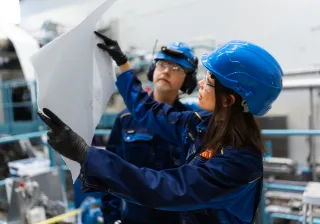Responding to the need for greener, high-efficiency solutions in the shipbuilding market, ABB Marine & Ports set out to design a novel propulsion concept. VTT provided R&D support in developing the ABB Dynafin™️, an industry-first electric propulsion concept that breaks new ground in vessel efficiency.
Key facts
Marine industry faces increasing demand for low-emission and energy-saving solutions to reduce emissions from vessels.
Technological advances in propulsion technology key factor in emission reductions.
Novel ABB Dynafin™ propulsion concept achieves very high propulsive efficiency resulting in reduced fuel consumption.
ABB Marine & Ports supplies world-leading technologies that are driving the evolution of sustainable shipping. Electrical propulsion, data-driven decision support and integrated solutions for ship and shore from ABB are paving the way to a zero-emission marine industry, providing greater efficiency and reliability to shipowners, and preparing vessels to meet the demands of tomorrow. ABB Marine & Ports operates in 26 countries and has 2,000 employees.
Stricter regulation on emissions
Around 90 per cent of global trade is carried by ships, and global shipping contributes almost three per cent of the world’s annual greenhouse gas emissions. If no action is taken, shipping could be responsible for up to 13 percent of global emissions by 2050. In response to these facts, the International Maritime Organization (IMO) has set the goal to cut annual greenhouse gas emissions by at least 40 percent by 2030, compared to levels in 2008, and to reach net-zero GHG by 20501.
Achieving this target requires major advances in fuel technology, alternative energy sources and propulsion technology. Currently the maximum propulsive efficiency of vessels, meaning how much of the power delivered to the propeller can be used for propelling the ship, is around 70%. This can be significantly improved by developing new propulsor innovations that also lower the consumption of all fuel types.
ABB has been a pioneer in developing propulsion systems, with the first idea for its innovative Azipod® system generated already in the late 1980s. Since then, the company has collected over 30 years of experience in propulsion technology. VTT has been one of its supporting research partners during these past decades, providing expertise in hydrodynamics to support product development at ABB.

Strength in analytical modelling
Considering that propulsion systems featuring screw propellers such as the Azipod® have reached their limits in terms of radical efficiency improvements, ABB set out to investigate possibilities for novel, high-efficiency propulsion concepts at the end of 2013. Among the 69 concepts considered over the following two to three years was a solution with individually controlled vertical blades that evolved into what is now known as ABB Dynafin™️.
According to Veli-Pekka Peljo, Senior Project Manager, Solutions Development at ABB, VTT was among the main supporting partners that ABB cooperated with when developing the concept further. Peljo considers VTT’s ability to create an analytical model of the propeller’s operation as one of their strengths.
“Besides providing us with expertise in the hydrodynamics of propulsion systems, and extensive knowledge of the marine industry, VTT had analytical tools that allowed us to calculate all the variables affecting operating efficiency. This was crucial in the first stages of development,” Peljo says.
VTT’s Research Scientist Ilkka Perälä adds that very few organisations globally can offer such analytical tools.
“There isn’t enough computational capacity in the world to calculate in detail all the parametres affecting the design of this kind of propulsor. The answer is then to have simplified yet powerful tools that can quickly present efficiency coefficients under varying situations,” Perälä notes.
Besides providing us with expertise in the hydrodynamics of propulsion systems, and extensive knowledge of the marine industry, VTT had analytical tools that allowed us to calculate all the variables affecting operating efficiency.

From theory to model-scale testing
Once the potentially winning concept was singled out, its mechanical, electrical and control elements were matured to assess full-scale feasibility. Also, the hydrodynamic performance was evaluated using advanced computational fluid dynamics (CFD) simulations.
“The next phase – testing a prototype in model-scale tests – is an important part of product development in the marine industry. It was convenient and efficient that we were able to successfully carry out the tests at VTT’s model basin located in Espoo, Finland,” ABB’s Peljo points out, adding that it is beneficial to have a research partner that understands thoroughly also the theoretical background on which all further development work is based.
During the ABB Dynafin™️ development project, VTT provided ABB with:
- A strong theoretical understanding of propulsion technology
- Unique analytical tools developed specifically for the project
- Additional resources for advanced computational fluid dynamics (CFD) simulations
- Open-water and self-propulsion tests in model scale
Teemu Manderbacka, Sustainable Shipping Research Team Leader at VTT is pleased with the long-term cooperation and trustworthy partnership created with ABB.
“Our aim is to closely listen to the needs of the customer and their views to better assist in the future development of marine technology. This project has been especially rewarding in delivering such significant results that can contribute directly to the pressing need for limiting greenhouse gas emissions,” Manderbacka says.

Enhanced efficiency, manoeuvrability and reliability
In further in-depth studies, including self-propulsion testing and lake trials to confirm manoeuvring capabilities, the conclusion was that achieving extremely high open-water efficiencies of up to 80–85 per cent was possible with the new solution. The novel concept can provide up to a 22 per cent efficiency improvement compared to existing propulsion systems in the same power range.
Benefits of the ABB Dynafin™️ concept for owners and operators of vessels include:
- High efficiency
- Excellent manoeuvrability
- High reliability and easy maintenance
- High onboard comfort level and sustainable operations.
According to ABB, following the highly promising results and encouraging feedback from customers, an ongoing full-scale development project aims to further enhance and productise the concept during coming years.
“We have only scratched the surface regarding the development of propulsion technology, so there is still much to be discovered. Building on our long-term relationship, we are happy to continue development work with VTT also in the future,” Peljo concludes.







